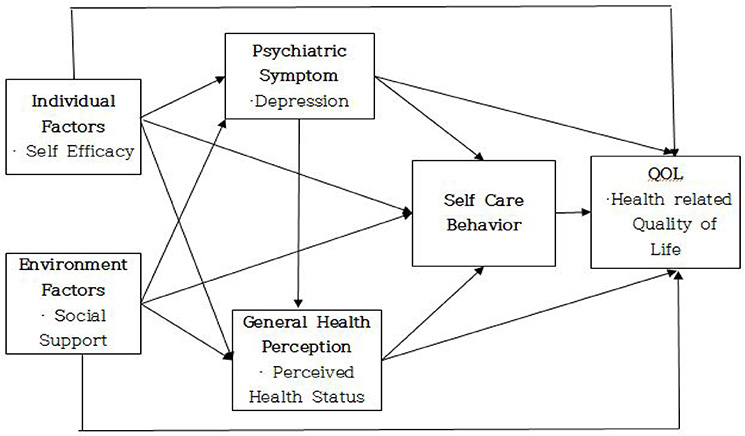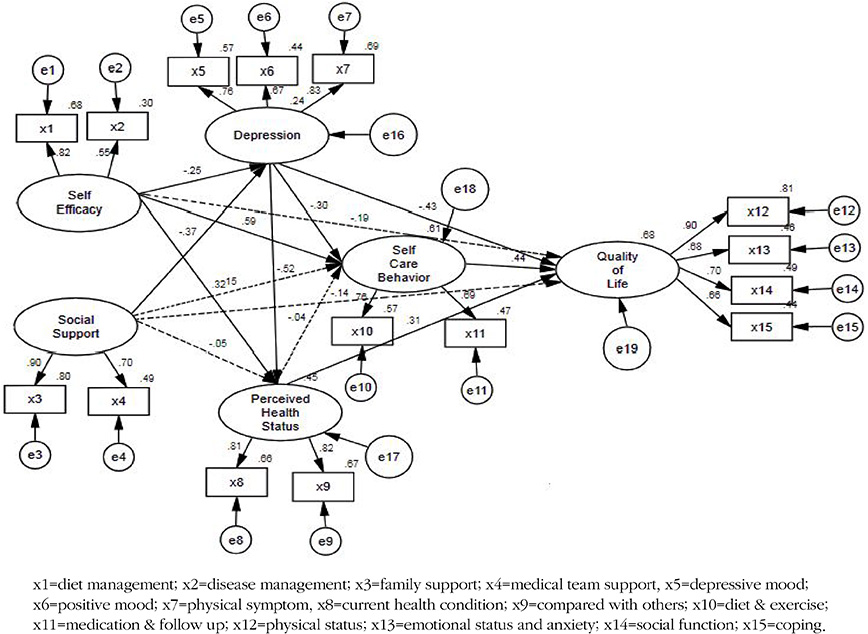Korean J Adult Nurs.
2015 Dec;27(6):613-623. 10.7475/kjan.2015.27.6.613.
A Predictive Model of Quality of Life for Stomach Cancer Patients with Gastrectomy
- Affiliations
-
- 1College of Nursing, Kosin University, Busan, Korea. taehope@kosin.ac.kr
- KMID: 2221715
- DOI: http://doi.org/10.7475/kjan.2015.27.6.613
Abstract
- PURPOSE
This study was designed to construct a predictive model to explain quality of life of stomach cancer patients with gastrectomy.
METHODS
Data were collected from July 10 to August 30, 2013 through survey using self-reported questionnaires. A total of 218 patients with gastrectomy was recruited from three different hospitals. Outcome variables were exogenous ones (self efficacy and social support) and endogenous ones (depression, perceived health status, self care behavior, and quality of life).
RESULTS
Goodness-of-fit of the hypothetical model was chi2=143.37, RMSEA=.07 CFI=.95, TLI=.93 SRMR=.05. Self care behavior, depression and perceived health status had significant direct effects on quality of life. Self efficacy and social support were affected quality of life indirectly. These variables explained 67.9% of total variance of quality of life, and self-care behavior was the most influential factor for quality of life.
CONCLUSION
The findings of this study suggested that self care behavior must be considered as an intervention strategy to improve quality of life. Also a development of a specific intervention program to promote self efficacy and control depression for patients with gastrectomy is essential to facilitate their self care behaviors.
MeSH Terms
Figure
Cited by 2 articles
-
Factors Influencing on Resilience of Elderly Gastric Cancer Patients
Mi-Seon Bang, Ji-Hyun Lee
Asian Oncol Nurs. 2017;17(3):170-179. doi: 10.5388/aon.2017.17.3.170.Distress and Quality of Life among Elderly Patients with Gastric Cancer: The Mediating Effect of Social Support
Yoon Sun Kim, Young Sook Tae, Gum Hee Nam
Korean J Adult Nurs. 2017;29(5):536-546. doi: 10.7475/kjan.2017.29.5.536.
Reference
-
1. Ministry of Health & Welfare. Korea Central Cancer Registry & National Cancer Center. Annual report of cancer statistics in Korea in 2012. Seoul: Ministry of Health & Welfare;2014. 12.2. Yun HM, Kim KY, Lee TY, Kim HJ, Kim KH, Kim DK. The factors affecting health promotion behavior among stomach cancer patients. J Korea Acad Ind Coop Soc. 2011; 12(10):4513–4522. DOI: 10.5762/kais.2011.12.10.4513.
Article3. Kim JH. Influencing factors on depression in stomach cancer patients receiving. Korean J Adult Nurs. 2012; 24(6):588–596. DOI: 10.7475/kjan.2012.24.6.588.4. Kim KH, Chung BY, Kim GD, Byun HS, Choi EH, Cho EJ. Cognitive function in breast cancer patients receiving adjuvant chemotherapy. Asian Oncol Nurs. 2012; 12(1):1–11.
Article5. Ferrans CE, Zerwic JJ, Wilbur JE, Larson JL. Conceptual model of health-related quality of life. J Nurs Scholarsh. 2005; 37(4):336–342. DOI: 10.1111/j.1547-5069.2005.00058.x.
Article6. Kim HW, Choi SM. Structural equation modeling on quality of life in pre-dialysis patients with chronic kidney disease. J Korean Acad Nurs. 2012; 42(5):699–708. DOI: 10.4040/jkan.2012.42.5.699.
Article7. Ko MS, Kim TS, Min S, Park JS, Yeom YH, Yun SH, et al. Introduction to nursing. 3rd ed. Seoul: Soomoonsa;2011.8. Kim MY, Tae YS. Development and effects of a web-based self-efficacy promoting program on stomach cancer patients with gastrectomy. J Wholist Nurs Sci. 2014; 7:51–65.9. Jeong HY, Kwon MS. The effects on self-care knowledge and performance in the individualized education for chemotherapy. J Korean Oncol Nurs. 2008; 8(1):8–16.10. Kim SY. Predicting factors on self-care behavior in kidney transplantation patients. [master's thesis]. Seoul: Korea University;2011.11. Lee IK, Choi JY. Relationship of body weight, anxiety, de pression and quality of life in patients with radical gastrectomy according to perioperative period. Asian Oncol Nurs. 2014; 14(4):212–220. DOI: 10.5388/aon.2014.14.4.212.12. Oh PJ. A structural model for health promotion and quality of life in people with cancer. J Nurs Acad Soc. 1996; 26(3):632–652.
Article13. Sousa VD, Zauszniewski JA, Musil CM, McDonald P, Milligan SE. Testing a conceptual framework for diabetes self-care management. Res Theory Nurs Pract. 2004; 18(4):293–316. DOI: 10.1891/rtnp.18.4.293.64089.
Article14. Satin JR, Linden W, Phillips MJ. Depression as a predictor of disease progression and mortality in cancer patients: A meta-analysis. Cancer. 2009; 115(22):5349–5361. DOI: 10.1002/cncr.24561.15. Kang HS. Related factors on quality of life in male bladder cancer patients. [master's thesis]. Busan: Kosin University;2008.16. Lee EO, Park HA, Kwon IG. Effect of discharge education of program of stomach cancer patient on patient's and caregiver's coping and quality of life. J Korean Acad Adult Nurs. 1996; 6(2):308–323.17. Moon SB. Basic concepts and applications of structural equation modeling: with AMOS 17.0. Seoul: Hakjisa;2009.18. Tae YS. A study on the correlation between perceived social support and depression of the cancer patients. [master's thesis]. Seoul: Ewha Womans University;1986.19. Cancer Net Podcast. Cancer and depression [Internet]. Alexandria: American Society of Clinical Oncology;2014. cited 2014 April. Available from: http://www.cancer.net/coping-with-cancer/managing-emotions/depression.20. Chon KK, Choi SC, Yang GC. Integrated adaptation of CES-D in Korea. Korean J Health Psychol. 2001; 6(1):59–76.21. Orem DE. Nursing concepts of practice. 5th ed. St. Louis: Mosby;1995.22. Lee EH. Development and psychometric evaluation of a quality of life scale for Korean patients with cancer (C-QOL). J Korean Acad Nurs. 2007; 37(3):324–333.
Article23. Lee EO, Eom AY, Song RY, Chae YR, Lam P. Factors influencing quality of life in patients with gastrointestinal neoplasms. J Korean Acad Nurs. 2008; 38(5):649–655. DOI: 10.4040/jkan.2008.38.5.649.
Article24. Andrews DR, Richard D, Aroian K. Factor structure of the Denyes self care practice instrument (DSCPI-90(C)). West J Nurs Res. 2009; 31(6):799–811. DOI: 10.1177/0193945909337726.25. Somerset W, Stout SC, Miller AH, Musselman D. Breast cancer and depression. Oncology (Williston Park). 2004; 18(8):1021–1034.26. Bultz BD, Carlson LE. Emotional distress: the sixth vital signfuture directions in cancer care. Psychooncology. 2006; 15(2):93–95. DOI: 10.1002/pon.1022.
Article27. Chae YR. Relationships of perceived health status, depression, and quality of life of breast cancer survivors. J Korean Acad Adult Nurs. 2005; 17(1):119–127.28. Kim EM, Kim KS. A structural model on quality of life for recipients of liver transplants. J Korean Acad Fundam Nurs. 2007; 14(3):340–350.29. Shin IS, Han SS. A study on cancer patients' quality of life, perceived health status and susceptibility·severity for cancer recurrence. J East West Nurs Res. 2005; 11(2):146–154.30. Salonen P, Tarkka MT, Kellokumpu-Lehtinen PL, Koivisto AM, Aalto P, Kaunonen M. Effect of social support on changes in quality of life in early breast cancer patients: a longitudinal study. Scand J Caring Sci. 2012; 27(2):396–405.
Article
- Full Text Links
- Actions
-
Cited
- CITED
-
- Close
- Share
- Similar articles
-
- Mediation Effect of Adaptation on the Quality of Life in Patients with Gastric Cancer Undergoing Gastrectomy: A Structure Equation Model
- Quality of life after total gastrectomy in the gastric cancer patients
- Quality of Life of Long-term Survivors after a Subtotal or a Total Gastrectomy for Gastric Cancer
- Quality of Life after Curative Surgery in Patients with Gastric Cancer: Comparison between a Subtotal Gastrectomy and a Total Gastrectomy
- A Study of the Quality of Life Following after Curative Surgery for Gastric Cancer



